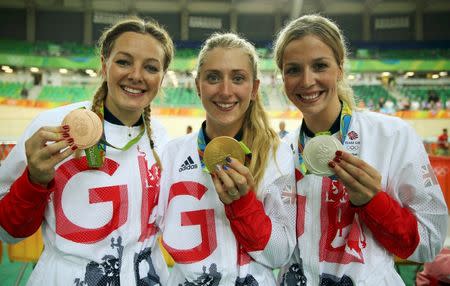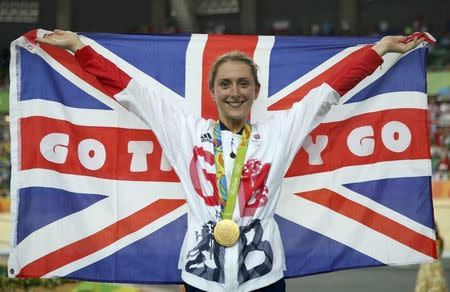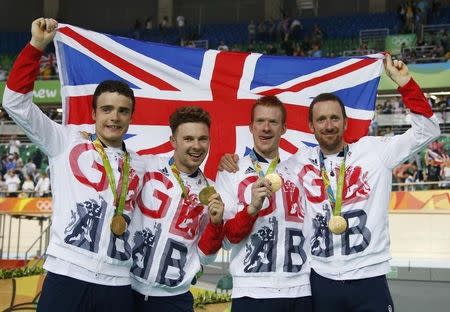Cycling - Britain's dominance leaves rivals perplexed
By Martyn Herman RIO DE JANEIRO (Reuters) - As Britain's track cyclists left Rio's velodrome on Tuesday with their saddle bags laden with gold, their rivals were left scratching their heads wondering just how they managed to keep peaking at the Olympics. "Of course we are wondering," Germany's Kristina Vogel, who did stem Britain's charge by winning the women's sprint, told reporters on the final day of a memorable track programme. "It seems they do nothing for three years, then they start at the Olympics and kill us." Yet there had been question marks over Britain's dominance of the boards this year. A slow start to the season was followed by head coach Shane Sutton stepping down in controversial circumstances shortly after the team had begun to click at the world championships in London with titles in five of the 19 events. Other envious nations must have hoped the British Cycling "machine" might finally have snagged its chain. How misguided they were. On Tuesday, Laura Trott cruised to victory in the omnium shortly before her fiance Jason Kenny rounded off a momentous six days by powering to keirin gold, his third of the Games. In the process Trott took her Olympic medal haul to four golds from two Olympics -- more than any other British woman -- and Kenny matched British track great Chris Hoy's six golds. And it could have been even better. Becky James was narrowly beaten in Sunday women's sprint final by Germany's double world champion Kristina Vogel, as she was in the keirin by Dutchwoman Elis Ligtlee. Chinese sprint duo Gong Jinjie and Zhong Tianshi won the women's team sprint in which Britain did not compete while Mark Cavendish was edged out by Elia Viviani in the men's omnium. In all, Britain won six of the 10 titles -- just down on the seven they scooped at both Beijing and London, although their total of 11 track medals (every member of the team going home with at least one) was two more than at home four years ago. GOT WHEELS TURNING Kenny, who along with Callum Skinner and Philip Hindes, got the wheels turning on Thursday with a surprise win over New Zealand in the team sprint, has become the team's talisman. "At my first Olympics in Beijing, I knew we had something special to build on," said the Englishman, who is aged just 28 and could well surpass Hoy's six-gold tally at future Games. "We did so well in Beijing, we matched in it London. We never thought we'd get anywhere near it here, but we've turned up and done the business again." Britain also shattered two world records in Rio. Firstly when Bradley Wiggins, now his country's most decorated Olympian with eight medals, led the team pursuit win over Australia. Then when Trott inspired the women's quartet to gold in a world-record time in the final against a U.S. side boasting a high-tech bike specially designed to beat Britain. Sprinter Matthew Glaetzer, part of an Australian team that went home with only a silver and a bronze, seemed baffled by Britain's ability to peak at the Olympics. "It's hard to know. Unless there is something hidden in there or some crazy advance in technology," he said. "But I think it's just they have done a great job in getting their athletes ready." Vogel had suggested something untoward was behind Britain's apparent invincibility. She later back-tracked. "I never said they take any drugs or have a bike with engines, but they always seem faster at the Games," Vogel said. "Of course it's a question. It's crazy are we are wondering and we just want to know what they are doing. They are obviously doing something right." The 32 million pounds budget British Cycling received for the Rio Olympics -- dwarfing the amounts available to teams such as the U.S. and Australia -- helps. Britain, with a total Olympic medal haul of 71, have now surpassed France (66) as the all-time leading track cycling medal winners. No stone is left unturned to find the "marginal gains" former team boss Dave Brailsford was once obsessed about. Iain Dyer, the man appointed as head coach by Sutton, said it was down to the athletes and forward planning. "First of all, we have outstanding athletes," said Dyer. "When you look at the times we have set on what is not a particularly fast track, it serves to highlight how good they were here. "Then we target the Olympics. We set ourselves up to be successful every four years. If you aim to peak every four years, it needs to be a bloody good peak -- otherwise it's just a pimple." (Editing by Mark Lamport-Stokes)

 Yahoo Sport
Yahoo Sport 









































